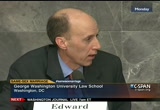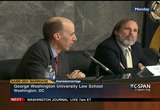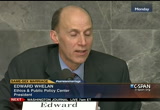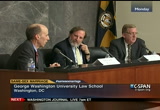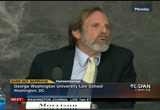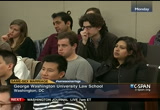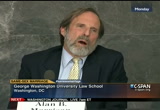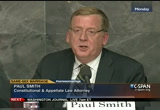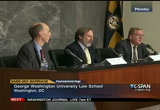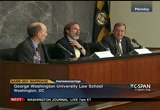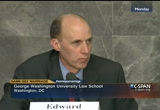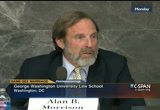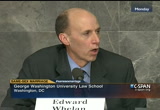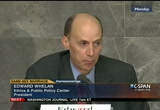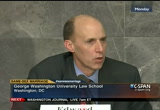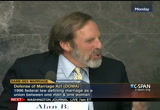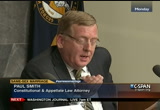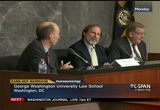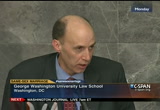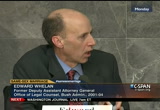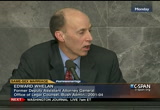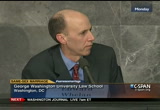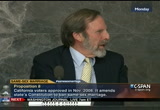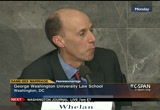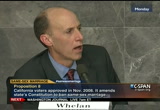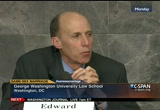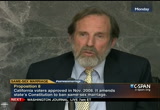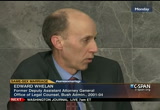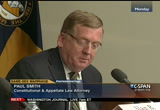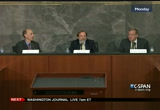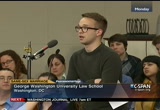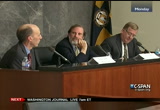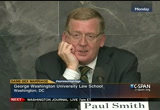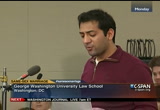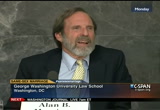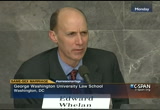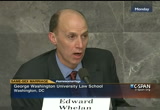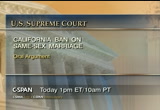tv Politics Public Policy Today CSPAN March 26, 2013 6:00am-7:00am EDT
6:00 am
are one of the most influential and best organized groups in modern politics. and in terms of political power and have gained political power and popularity more than any other group in history. that is something to celebrate. but to come in here and to claim that they're politically powerless and that they need to have the special benefit of heightened scrutiny, i think that just does not wash. >> for a variety of reasons, everything he said makes no sense. a first of all, can you attract the attention of other people in the political process, under that standard, we have to get rid of heightened scrutiny for black women, women, the groups that cannot attract the ability of the political process. more importantly, the whole idea that somehow because the obama administration happens to be more sympathetic than the
6:01 am
bush administration, that the constitutional law will change, that is controversial. the theory in 1965 that you could be fired from every employee job if were found not a be gay, everybody had constitutional right to marry a same-sex partner. now they do not. they've pushed it through in a few states. that cannot be directly to think about it. if we think about the factors that are very important, it is neither an mutability or political powerlessness. it is the other two factors. is this a group that has a history of being oppressed and prejudiced? yes. is the characteristic we're talking about something that affects your ability to contribute to society. nope. once those questions are answered, the other two the courts as are sometimes important and sometimes are not important. political powerlessness to not have much to do with the decision in 1975 to make
6:02 am
heightened scrutiny applied to gender discrimination. that whole scenario tells you. >> those laws being challenged were written before women either have the right to vote or exercised it in any considerable fashion. the books. >> we are talking about were written at a time when you would say they did not have any political influence. comparablehat it is to what blacks and women och experience, it was nothing of this sort. >> i do want to raise the question naturally, the
6:03 am
political power of the gay and lesbian community has increased substantially in the past 15 years. there's no question about that, is there? that is one of your. and one of paul's. . >> a friend at a law firm in town said, you cannot be any law firm in this town and oppose same-sex marriage. clearly, he had to leave his law firm. >> i think that was for somewhat different reasons. it was because they had cleared the case. >> you believe a lot of things. >> should we judge doma on the political powerlessness of 1996 or as of today? the theory is that you measure the degree of scrutiny based on
6:04 am
the ability to affect it in legislative process, not simply to be heard. there were not very powerful lobbies back in 1996, were there? >> actually, there were, but the more important thing is that you looked to now because of the political power to exercise same-sex marriage within a state, to repeal doma and a host of other things. it is precisely why that rhatigan go to a highly contentious approach -- why rather than going to a highly contentious approach with decades of destruction of politics over this, it would be best to be worked out through the genius of our system in the different states and by the federal government. we can all make arguments to each other about how that would
6:05 am
be and not just have five to nine people make judgments about imposing a right on us. >> it is easy to say to all the people living in the states where they have no employment protection, housing discrimination, no recognition for the children, and no hope of having any of that change anytime soon. that is the reality of the situation if you go state-by- state. it will be 50 years of people waiting to get those basic kinds of equality. that is the reason why civil- rights movements are entitled to go to the supreme court and say, this kind of discrimination ought to be taken off the table. it is unacceptable and not justified under the standards it applies. int is what the plaintiffs the doma case andy perry case have done. and the doma case is even weirder. these are people who were
6:06 am
married in their states. >> the state of new york would have recognized the marriage. >> there are people who dispute it. but now the governor of the state of new york. >> it was not settled in 2009 when the woman died. many any rate, there were people married under their state. >> why should those people have to come to congress in order to be treated with minimal debates ebright their own government when their state have married them? >> i think that brings the question of of minimal dignity. this gets to the whole question of exactly what doma does, which perhaps we can turn to. >> i want to do two things
6:07 am
first. but first i want to ask paul, if the plaintiffs in doma are asking for some kind of rational basis or some kind of higher review, is there any basis for doing it if your state is medium rare or medium? >> i remember talking about the debora levels of scrutiny and it suggested that there was this -- for its intermediate scrutiny for gender. >> if you go back to some of these cases, there were times when the court is more likely to be skeptical of justifications. and these are situations that are somewhat parallel to those that apply to getting you to heightened scrutiny land. which is to take a ride with a fairly good reason to think that it was a lot paste -- a law based on animus or prejudice.
6:08 am
the law that kept the mentally retarded out of a neighborhood and a pretended it was a traffic concern and it was obviously protectionism. romer was amendment two from colorado, which was enacted by popular vote in enacting this vast ban on any gay people in the state of colorado. whether it is a tier of scrutiny kamal orrick you say fourth you call it a tier of scrutiny or whatever you say, the rational basis supplies, but differently in different circumstances for you have different concerns about what is going on, that is what the supreme court has done, like it or not.
6:09 am
>> i will give you a chance to respond, and then we will take a short opportunity for the audience to ask questions, and recognizing that we will get to the other questions in just a minute. >> i would like to say very briefly that i think paul's discussion illustrates the and coherence of -- the incoherent of the court's approach to of the- incoherence court's approach to these things, the lack of intellectual integrity in their approach to these reviews. it is why we ought to expect the court to exercise judicial restraint and return to a genuine rational basis review. >> it is difficult to have a debate about something if we will not start with the proposition of all of the existing supreme court case law working with these. >> you did not like the passage clyburn. >> it is not the law. it is one case. that criteria has not been applied to other situations.
6:10 am
>> i'm happy to discuss the law, but i would have to say that the law as it is is not coherent. the law as it is does not recognize gays and lesbians and you're trying to change that. the want to next turn to justifications. the question i want to ask first of all to paul and then to add -- ed is, should we look these justifications as applying -- are the same that apply equally in both the prop 8 challenge and to the doma challenge? >> some of them only apply to doma. and understand what you mean by
6:11 am
uniformity, but it is for the justification of the defense of marriage act. >> by uniformity -- ? >> as i a understand it, for simplicity sake, the federal government does not want to discern between different gay couples and they want to treat them equally as bad. as unmarried. >> there are lots of gay couples that which they were married and are not married and they will not get all the benefits of treatment by the federal government. in other words, in order to treat all same-sex couples as unmarried, we will treat them all the same. thehat congress said in defense of marriage act is that -- the interest here is making
6:12 am
sure that a married couple in texas is treated the some -- the same as a married couple in massachusetts. so that it is uniform throughout. >> there are two categories of married people, those that get in and those who do not. we are distinguishing would sheen -- distinguishing between married couples. and they want there to be uniform treatment of all same- sex couples, married or not. that is their argument. i do not think it is a very strong argument. >> to have a uniform set of rules, that we do not have to worry about whether somebody is married in one state or another. moveis is the people around argument, which is the idea that it will be confusing if we do not have a defense of
6:13 am
marriage act that says the people are out as far as federal purposes. some people who are married in massachusetts will move to texas and the state of texas has some authority under the constitution to not always recognize other states marriages if they are against state public policy. some states will marry first cousins. other states will organize those marriages, my marriages. -- those marriages, common law marriages. and if we start having people move around -- common law marriages. and if we have people move around, there will be confusion created by that. and the answer is, the kind of situation that has been rising for decades and decades as other couples have been moving around and the federal law has various law provisions about when you live in a state that does not recognize your marriage, sometimes you'll be treated as married for federal public -- purposes and sometimes you will not.
6:14 am
it is blunderbuss to say that we will not recognize the marriages of any same-sex those who get married in massachusetts and massachusetts. a much simpler solution is to have a much cleaner towards of logroll where you say come -- a choice of law rule where you say, if you got married, it counts. you certainly do not want to deny equality to the vast majority of married same-sex couples who do not have any interest in moving to the state of texas where they are not married. >> the reality is, there is no substantive position that is neutral. whenever position the government takes, it either subsidizes or refuses to subsidize. what congress decided in 1996 with a simple matter that it was quite to stick with the
6:15 am
traditional definition of marriage. the definition has always been understood to exist in the versions of federal law. it was codifying it against traditions of reinvention. we can just degree as a pack -- a matter of policy and say there's no reason to subsidize same-sex marriage. it is permissible for congress to have gone either way. it went against subsidizing forcing the taxpayers, the federal taxpayers of states that do not have same-sex marriage to subsidize it for the states that do. >> every indication, including a study by the gao, is that it cost the u.s. money not to recognize the same-sex couples that are married. >> why should that be? >> because when you have people
6:16 am
that are married, but they get treated as a single run than married to might cost more money pipit there was a proposal -- costs more money. there was a proposal died at made at the same time as doma and it was voted down. there is no financial benefit to the same-sex couples. the net benefit to recognizing these marriages would be for the federal government. >> these studies are very much contested. >> there is no study on record in any of these cases not with the congressional budget office. >> no one has tried to put anything at all into evidence to the contrary. the >> it is perfectly reasonable for congress to make long-term assessments. and the whole question of
6:17 am
whether congress should be endorsing the same sex merit -- marriage movements by redefining the definition of a spouse under law -- >> but that justification is different. but wouldn't congress be able to achieve the same kind of uniformity by saying we uniformly applied the law as paul suggested? it would be uniformity. it would be a different kind of uniformity of uniformity was the-- if uniformity was only value at stake. >> i have no doubt there are different aspects of uniformity that congress could reasonably choose to pursue in different circumstances. each of those is a reasonable option. >> may be will get one item of agreement. that uniformity is not an issue with the prop 8 case. >> i think that is right. >> actually -- >> i thought i was going to get agreement. >> there is an argument that prop. 8 makes with the 18,000 or so same-sex marriages that
6:18 am
occurred in california between the time that the state supreme court opinion and the effective date of prop. 8. thehat is not at issue in perry case itself, is it? >> the plaintiff has argued that there is a certain irrationality in prop. 8 in permitting those marriages to continue. >> but it is not the same kind of definitional uniformity problem that there is in this case. >> know. -- no, i agree. >> ok, second, it is often said that one of the reasons that states on the one hand and federal government on the other did not grant the right to marry in the case of california or grant the right to have benefits or whenever burdens there may be in the case of doma is because the voters in california and the congress in
6:19 am
doma were acting out caution and wanted to maintain the status quo. is that a few that you think it's helpful -- is helpful to either side in the cases? >> the debate over the long- term consequences of what redefining marriage would be, i think that people can reasonably but is ultimately unknowable. i think it is sensible for the state or federal government to say, why don't we learn a little bit about what is happening in those jurisdictions? why don't we hold back and see? why are we rushing to this latest fad and wire we not learning from these other cases? >> was their caution in either
6:20 am
or both of these? >> it york. use caution as justification, -- if you are going to use caution as justification, you have to -- if you are going to use caution as justification, you have to express we were worried about. long-term consequences are another way of -- what are you saying? >> this discussion has avoided addressing what marriage is. the threat that icy -- that ipod pitzi see if the permanent is the that i see permanent collapse of the marriage culture in this country. let me be clear. we are already in his state of the collapse of cultural marriage in this country. heterosexual couples are responsible for it. if we understand the importance of linking marriage to procreation and childbearing, and we understand that the goal ought to be the possibility
6:21 am
that children are raised in stable households by the father mother who gave rise to them, then we ought to be wary, very wary of redefining marriage in a way that completely reoriented away from its core and takes out of it this male- female component that is what marriage has been all about. i guess, many of you are too young to realize this i suppose, but 15, 20 years ago -- i think all will agree with me on this -- the idea of same-sex marriage was not widely accepted. it was distinctly a minority position. >> i will give you that. >> one can view this in different ways.
6:22 am
you know, as a testament to the political power of gays and lesbians, there has been this transformation. i ought to invite caution on the part of people. do we really know what happens when we redefine marriage in such a fundamental way? you look at all of the social pathologies associated with out of wedlock birth -- again, heterosexuals. let me make that clear. but if this country's going to survive 30 or 40 years from now, then an important part of is not to redefine marriage completely away from its central purpose. >> this is the same responsible procreation justification. >> can we talk about caution, not about inappropriate procreation caution, but legislative caution. toyou think it is fair
6:23 am
describe this as caution? >> it is one thing to say your point to pots -- that you are going to pause and setting the issue, etc. -- study the issue, etc. you pass and -- passed a law that has no steady. >> it is federal law. >> it could be, but it has been on the books for a long time. at what point where people saying, they were being cautious in 1996, so now and 2013 that is the justification that will allow continued discrimination, despite the last decade of experience that we have with same-sex couples marrying and the reason people have changed their views about this so dramatically is that they have been able to see what that means, not only to those people and their communities, but the idea that this is going
6:24 am
to make marriage for straight people less desirable or less desirable -- less believable as believed in has proved, i submit, to be fanciful. >> i think that it is sensible for someone to think that you can draw conclusions from 10 years -- i'd think it is fanciful for someone to think that you can draw conclusions from 10 years of data. there's no way you can. and to think that you can place -- play social scientist and contradict what experts are saying, this is a matter that will take decades and decades and decades before you're even able to draw any conclusions, if even if not you are then. >> and what does that mean in terms of changing the law? >> in means that it is entirely reasonable for the congress to change the defense of marriage act. and it's entirely reasonable for congress to revise it. it is not something that the supreme court has a proper role
6:25 am
in. >> you think it matters that in the case of california that california has had domestic partnerships for some time frame? that is to take away if the consequence that you are worried about, -- that is to say, the consequences that you're worried about, wouldn't between same-sex couples as well as opposite sex couples and wouldn't allow for some kind of understanding as to what has happened? >> again, it has only been, i believe, since 2003 that california has had a robust partnership law. alan's point is that the robust domestic partnership regime and how foreign is equivalent to civil regimes elsewhere. it is in all the rights to domestic partners. it does not give the name.
6:26 am
we said earlier that it cannot call themselves married. they can call themselves whenever they want. >> not if they apply for a passport. >> if they are married they cannot do that. >> it is a federal crime. to say you're married on a federal form? >> there would be a question there. >> people on both sides agree that the word marriage matters. the gays and lesbians see it as a degradation of some sort of recognition. those of us supporting to a traditional marriage see the word marriage draws on its traditional role that is tied to procreation and child rearing.
6:27 am
we want men and women to understand that marriage is the ideal context in which to raise children, and in a sense to read the fine marriage in a way that eliminates the essential components. >> you have a bunch of people out there raising children right now cannot get married. if you think marriage is an important thing to happen your parents, if you think they would benefit from having unmarried parents. alln california they have the rights but not the label. >> even then they do not give federal rights. >> that is a separate question. >> but right now they do not get any. there is no relationship recognition at all. in order to avoid the
6:28 am
speculation that straight people are going to be more likely to have children and their household without being married, how do make that happen as? calculus? i do not understand it. street people will have more kids about getting married because you're letting gay people getting married is speculation at best and is offensive. people are so unhappy with the people getting equality they will stop getting married. >> that is not the argument. >> what is? >> let me agree with you that the interest of the kids being raised by same-sex couples are a factor in the calculus. did the argument is not that people are going to be offended by same-sex couples. the argument is that the redefinition of marriage away from its core components says marriage is not about procreation at all.
6:29 am
you have millions and millions of potential victims of a classic marriage culture. if we do not restore that, in this country is doomed. >> you think that applies the same whether you have civil unions or an institution called marriage for same-sex couples ? >> you think the tipping point is what it is called. >> i think it is a significant defining point. there is this inconsistency in the arguments that i hear in that we hear that the kids of
6:30 am
gays and lesbians by any measure do as well or better than anybody else. on the other hand, and this is not married gays and lesbians, but somehow there's so hurt. >> you said marriage is the most important thing. that is the harm. it is illegitimate children living with their parents. they do not have this option and being married. >> what is the big deal? if gays and lesbians have all the bright except being able to being called married and they say we want to be called married in california has given them all the legal rights, what is the big deal?
6:31 am
who has the burden of showing what is the big deal? >> the first conclusion you draw is that there is only one remaining potential justification for what the state is doing. that is to maintain the idea that message that same-sex relationships are less valuable. that was off the table. we won that 10 years ago. >> you won that in the case of a criminal case. >> it stands for more than that. >> you may be right.
6:32 am
>> i would be very surprised. >> is reading of the majority opinion was quite accurate. >> it was a criminal case. it certainly was. moral disapproval. what is the big deal? where do you stand? >> the use of the word marriage masters. it matters because we have a concept of marriage that has existed throughout western history of a man and a woman and it exists for a purpose. i am repeating myself. >> to whom does it matter? >> society in order to encourage men and women to have and raise children in the best contacts-- context
6:33 am
possible. >> that is why the proponents are injured by the non- enforcement. >> if you are trying to tie in a standing question, the proponents are standing in the position of the state. you will not mean to. the state has interest in defending the law. these opponents are starting interest to the state. the concern is about how society and the institution of marriage will be damaged by this radical definition. >> you agree that moral disapproval as off the table? >> we are not going to criminalize a homosexual activity.
6:34 am
we cannot do that. we disapprove of its. we are not going to allow same- sex couples to call themselves married because we disapprove. >> moral disapproval has nothing to do with these bases for defending traditional marriage. are there some voters who may have voted because of proposition 08 because of moral disapproval? it goes both ways. of course people will have mixed motives. >> do you think the states in the house report and on the floor are off the table? the court may not consider them? >> of course a lot of this will tie into which standard of review the court and adopting.
6:35 am
when you have plenty of statements in the congressional record discussing the importance of uniform eligibility it is weird cherry picking to say we will give decisive wait to these one or two or three statements. >> one or two or three? my goodness. the place is replete with expressions of homosexual update is something that ought to be condemned. this is not the gist of that debate. >> there were lots and lots of gay-rights supporters who voted for the defense of marriage at who had strong support for people like the game right. the numbers are something like 87-13 in the senate incomparable in the house. the idea that it drove the
6:36 am
adoption of doma -- >> it was an election year and a people do not have the political power to protect themselves. >> i want to ask whether, are there any intermediate positions between striking doma down entirely and up-holding? >> i do not think so. >> you said that there are different cases. they are. the question is, do these states have the authority to retain the traditional state of marriage? not that they have to. may they? it is the question on both. >> not asking you to yield their
6:37 am
position. are there any interim positions in the case that the court could find between on the one hand doing what they suggested, to say the states have the full power to uphold or to change or do anything was same-sex marriages? and what the strongest view of the challengers is in prop. 8 that calls distinguishes our unconstitutional. >> one is a standing argument. >> it would be in a weird way. it would probably mean that there be marriage equality restored in california. >> why? >> the judgments stays in effect. i do not think that is clear at all. it is more than that.
6:38 am
>> what you think the governor will do? next day there would be wedding bells. >> this would be nothing to do that. the merits in the case, there is a narrower grounds which were basically judged by reinhard. california created a separate institution of domestic partnership. the argument would be that the state that has done that has essentially disclaims any meaningful state interest in continuing to hold the "m" word for same-sex couples. there is no real meaningful distinction.
6:39 am
>> the question of whether the other 35 states have to. the other one would be taking california and in ticket back. >> what did he say? >> he wove them together. >> they're always driven by coherent. >> interestingly, the defenders of doma and prop a hero how the world has changed since doma was passed. and how, regardless of what power the gays and lesbians had in 1996, they surely have more power now. that argument is in boats at the conclusion of the reply brief of chuck cooper representing prop. 8. what kind of impact do you think that clear change in the political world is likely to be had?
6:40 am
>> it makes manifest that rather than imposing on the country another roe versus wade, this is a matter that is being addressed through a robust of a credit debate. the debate will continue. i have no illusions that my preferences are going to prevail everywhere. >> the genius of federalism is that things work out. and satisfies our people's interests. there is more a sense of this has been a fair fight. the legislative process is also
6:41 am
far better coming up with accommodations, protections for religious liberty, all sorts of compromises and the declaration of a right which anyone who supports traditional marriage is the equivalent. >> do you think keith precludes the statute you refer to? >> look. the very rhetoric says the position that president obama had until a year ago is akin to racial bigotry. look.
6:42 am
6:43 am
it would not be good for the country. if there is a declaration of a fundamental constitutional right to marry a person of the same- sex. >> can you talk about the analogy? >> the change a popular opinion will have on the justices. you have one hypothesis is that the election returns. that is a cliche. they will be comforted by the fact that they're not getting too far ahead the american people. then you have the alternative which is being strongly argued by the other side. this is just a moment not to get involved. there is no way you can tell what will affect which the justice which way.
6:44 am
in terms of the roe v wade specter out there and the creation of continued war, this is backed up empirically. these issues are fundamentally different in that because unlike abortion, there is no victim they believe is being murdered. people very easily accommodate themselves to allow everybody to have the same opportunity to enjoy the benefits of married. you see this in state after state. people just calm down after a couple of years. if the supreme court were to say everybody has a right to marriage equality there will be some hub of about that.
6:45 am
i do not think it'll be remotely comparable to the roe v wade situation. >> paul may be right that the aftermath of a role like ruling will be very different in the context of same-sex marriage and an abortion. it may play out over the decades in a tax on traditional religious believers. for example, can you qualify for a grant or a scholarship? can you get a government job if you hold this position that is suddenly declared bigotry? it would be very contentious and divisive process. i agree that it might well play out in a very different way in the role it has played out.
6:46 am
>> audience, next chance for questions. >> wow. >> let me get this out there. mr. whalen, get the sense from seeing the amount of young people in the room that he may be in the minority, just guessing. i am glad you here. young people do not see what is the issue. that said some people may even say what is the big deal about getting married but that is another radical thing i will i get into. >> we'll have 10 minutes. >> you talked a lot about tradition and a radical notion. how does this relate to the loving versus virginia? >> my question is for paul smith.
6:47 am
what is the primary purpose of the federal government incentivizing marriage in the first place for anyone? if same-sex couples can show they're able to fulfill the purpose, what a special or unique about same-sex relationships that should preclude the federal government from incentivizing any and every other relationship that could fill the purpose such as brothers and sisters that want to live together and file a joint tax return? >> commentators have compared this to decisions such as plessy and brown and their significant to the african- american community. how do you think the court will weigh the legacy of those cases in their decision? three great questions. the panelists all answer however they want. >> the ugly anti laws were recognized as to the traditional
6:48 am
understanding of marriage. they were phrased that way. they were in positions and a restriction on top of what marriages. by contrast this has adhered into what marriage always has been. it involves a radical redefinition to say it is not a male/female union. >> the questions involved the idea that the federal government has a long history of incentivizing marriage which is complicated. the basic posture of the federal government has been not to do anything about marriage except except state decisions. there are some benefits that help married families and widows and things like that. there are some taxes that go up.
6:49 am
but there it encourages marriage economically is the complicated questions. why should whatever that is applied to people who want to marry their family members, wise? whenever you start getting into these parade of horribles, whether prostitution or polygamy are incestuous, and there are other interests at stake. incest is the clearest example. the reason why it prohibits is they are both psychological and physical health reasons why that is inherently and help the of the situation. the state has a legitimate interest unrelated to anything we have been talking about today in regulating that. >> how prejudice of you to deprive adults to believe that their happiness depends on airing the assemblies from preventing the assemblies from doing what they are able to.
6:50 am
>> they're willing to take the risks. who are you to say they can. polygamy, it is not a slippery slope argument. as a matter of history, polygamy is up the slope from same-sex marriage. we have had plenty of examples throughout history. there's a distinction between two and three and less removed to redefine marriage as a same- sex union. >> we will look around. whenever you talk about these limitations, that whole case of plessy in separate but equal, california will have these two
6:51 am
institutions. it is very reason it did of the separate but equal concept. >> i wish there was the more time getting the law right and less time worrying about what their legacies might be. >> thank you. >> we were talking about political power earlier. the argument was brought up that there are specific ones that have political power presently. should those protections at some point been taking away when they are seen to have enough political power? >> that is a very interesting question of what i have no view. i am a skeptic of the legitimacy of this high scrutiny
6:52 am
enterprise. >> thank you all for being here. some opponents of marriage equality say that same-sex marriage bans are not discrimination because straight men cannot marry a man and a man cannot marry men. opponents the marriage equality for interracial couples said it is not discrimination because of blacks cannot marry white and white cannot marry blacks. how would you respond to those arguments? >> that is the kind of argument that is made and all of these cases. it does not work. the texas, sexual conduct laws do not discriminate against gay people because it also prevented straight me from getting together with other straight men. it is idiotic.
6:53 am
the law specifically targets a group of relationships you have the same orientation that want to form these marriages. there's no serious arguments that now stands that these cases ought to be analyzed based on sexual orientation. we're not going to draw this between conduct and status. gay people have both a concept and a status. we will not let that word anymore. >> many supporters argue that traditional marriage laws are better understood as discrimination on the basis of sex rather than sexual orientation. these arguments are not the most effective arguments to make. they fail to get to what ought to be at the core, what is marriage? what is the purpose? if you understand that everything else falls in place. >> we are going to have to wrap it up because we're getting to 5:30. my question is about the
6:54 am
marriage institution. by all respect, the way that you look at the history of marriage institutions to me is not a science. it is not a cultural science. it is hypocrisy. the way you that you're saying if marriage social goal is to create more human beings, why do we even let people who do not conceive be married? you are not even let him be a bull or homosexual people to be married. ask them why we can help society? the third thing is the way you
6:55 am
are segregating our society to say a man and women can get married, to me it is the same arguments not to a segregated society. based on what? our social goal for marriage is to reproduce? >> the time is up. we really need to get this down. >> i'm going to try to speak as quickly as possible. i have a lot of sympathy for mr. whelan's for letting it take its course. how deep into people who say this is taking too long and all of the gay couples in states
6:56 am
where they did not have these rights, how do you answer that? what is your response to that? >> it is an anthropology that all social scientists recognize, people on the left, and this is not something i have come up with. this is the consensus until it became fashionable to promote this new cause. the point is the tradition of marriage has developed exactly as it has with the opposite sex union. we do not have orwellian fertility tests. the fertility tests they would be contemplating will be sending you see in a totalitarian regime. it would not be very exact anyway. it not a simple matter. the law generally presumes
6:57 am
fertility. a couple that is infertile is often one person who is fertile and it ensures that the person is not have children outside the question about whether it is too long presupposes there's only one answer that can happen. do not be sufficient answer to let it be worked out here because it doesn't, that is what should happen. it is not a matter of anything taking too long. it is a matter of people in different states working out how they want to address this matter. >> this is one of the rare moments in history where a new minority group has come along and made a very fundamental claim that says it is time for us no longer to face these basic
6:58 am
forms of discrimination. it exists for us as much as anybody else in this country. they are entitled to call on the courts to do that even though we all agree that this is democracy. >> thank you very much for staying with us this long. [applause] [captioning performed by national captioning institute] [captions copyright national cable satellite corp. 2013] >> the supreme court hears arguments for and against same- sex marriage. a is hollingsworth vs. perry case challenging the constitutionality of california's same-sex marriage ban. it follows the 2008 passage of proposition eight ending same- sex marriages. the ninth circuit court of
6:59 am
appeals heard the case ruling opposition eight unconstitutional. wednesday the court hears u.s. versus windsor on the defense of marriage act. the administration will not argue in defense of dopma. he will bring you the recordings when they are released starting at 1:00 p.m. eastern here on c- span. live on c-span "washington journal," and at 1:00 p.m., we will bring you the audio from the argument from a u.s. supreme court. in 30 minutes, supreme court reporter david savage gives an overview of the same-sex marriage cases before the court. more on same-sex marriage and the defense of marriage act with harvard law professor michael klarman. at 9:00 a.m. eastern, sudeep reddy
121 Views
IN COLLECTIONS
CSPAN Television Archive
Television Archive  Television Archive News Search Service
Television Archive News Search Service 
Uploaded by TV Archive on

 Live Music Archive
Live Music Archive Librivox Free Audio
Librivox Free Audio Metropolitan Museum
Metropolitan Museum Cleveland Museum of Art
Cleveland Museum of Art Internet Arcade
Internet Arcade Console Living Room
Console Living Room Open Library
Open Library American Libraries
American Libraries TV News
TV News Understanding 9/11
Understanding 9/11


